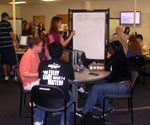Transforming the Teaching of Science
Changes in the way UMBC faculty are teaching introductory chemistry is not only increasing pass rates but creating more interest in chemistry.
Professors Ralph Pollack and William LaCourse came to Diane Lee, dean of undergraduate education, with concerns about student performance in Chemistry 101. The large lecture classes that usually contained over 200 students left little room for more than a handful of students to participate, and additional weekly recitation classes did not make a difference in student grades.
The Department of Chemistry, the Office of Undergraduate Education and the Shriver Center worked together to create the Chemistry Discovery Center, a problem-based, high-tech learning lab (University Center, Room 201) focused on cooperative learning. Two years later, pass rates in Chemistry 101 are increasing, fewer students need to repeat the class and faculty have seen additional improvement at all grade levels. The number of majors, second majors and minors in chemistry and biochemistry is growing. And an overall improvement in group skills is also migrating to upper-level chemistry classes.
“Science is a cooperative endeavor, not a solitary one,” said Pollack. “In the Chemistry Discovery Center, students become active participants in the learning process, and we know that those who work in groups do better than those who work alone. It gets them thinking about problems and coming to their own conclusions. They’re not just memorizing.”
During two-hour weekly sessions, students divide into groups of four, and receive worksheets to guide them in their development of the ideas and principles that form the basis of the unit being studied. Students take ownership of the group through rotating roles, from managing the group to computing and recording the information. Faculty and teaching assistants can send and view group work from a central monitor. (UMBC’s Continuing and Professional Studies helped fund the lab’s first year, while the National Science Foundation funded the second year.)
“You don’t really understand the information until you are doing the problems yourself,” said freshman Frances Andrada. “Working with your peers and helping each other makes it easier to remember the information.”
“Students become more independent and responsible for their learning by developing critical work skills – teamwork, communication, management and self-assessment. It’s another way UMBC provides students with an entrepreneurial skill set,” added LaCourse.
Lee said that the Chemistry Discovery Center’s success has sparked interest from other departments in science, technology, engineering and mathematics in creating similar labs. “It’s wonderful to see students excited about solving problems. What’s more, for those students who want to become teachers, it shows them firsthand how to make science more accessible.”
UMBC and partners in the Chemistry Discovery Center will celebrate its success with a ribbon cutting and reception on May 11. President Hrabowski will begin the program at 9:30 a.m. in the University Center, Room 201.
(5/7/07)
© 2006-07 University of Maryland, Baltimore County 1000 Hilltop Circle, Baltimore, MD 21250 410-455-1000

